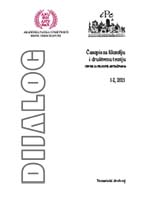Hegelova kritika Kantove filozofije
Hegel’s Critique of Kant’s Philosophy
Author(s): Mile BabićSubject(s): 19th Century Philosophy, German Idealism, Philosophy of Religion, Ontology
Published by: Akademija Nauka i Umjetnosti Bosne i Hercegovine
Keywords: difference; unity; identity; contradiction; theoretical reason; practical reason; absolute reason; ontological difference; death of philosophy; death of God;
Summary/Abstract: G. W. F. Hegel critiques Immanuel Kant for his assertion that philosophical reason cannot know (cognize) the Supra-Sensible (God, the Absolute). In his view, Kant’s idea of God is an empty notion and fails to comprehend either His existence or His Being. Kant considers God a postulate of practical reason (free reason), and for Hegel postulation is a subjective and non-rational act. To deny that philosophy can know God is to declare the death of both philosophy and God, insofar as God is the proper object of philosophy, for Hegel. Kant considers human cognition to be finite (determinate) and reason self-critical. He distinguishes knowledge, faith, and three types of reason and supports the unity of the human cognitive faculties. He sees difference and unity as postu¬lating and including each other. Hegel, however, reduces faith to knowledge and holds reason to be absolute. He converts Kant’s differences into opposites, dualisms, and contradictions, which he then reduces to the same (the identity principle). Hegel sees no ontological difference between God and humanity and places them both on the same ontological level, which ultimately brings them into conflict and causes them to exclude each other. He turns them into idols. Hegel’s merit lies in making philosophy historical, given that absolute reason manifests itself in history. As a result, history is a chronicle of violence governed by the principles of identity and contradiction.
Journal: Dijalog - Časopis za filozofiju i društvenu teoriju
- Issue Year: 2021
- Issue No: 01+02
- Page Range: 49-70
- Page Count: 22
- Language: Croatian

